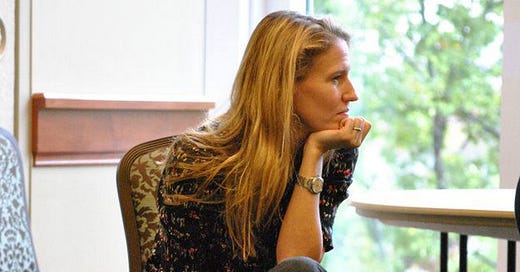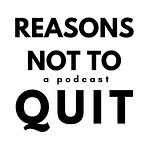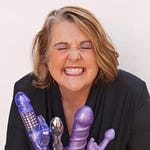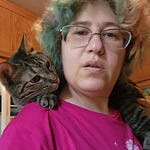Hanne Blank Boyd:
Welcome to Reasons Not To Quit, a podcast about people and the reasons they find not to quit when the going gets rough. I'm your host, Hanne Blank Boyd. If you, like me, have ever felt like you weren't sure how you were going to keep going, you're in the right place. Each week, we hear from someone who's been in that place who talks with us about what helped them keep going when they needed a reason not to quit.
This week's guest is Jennifer Baumgardner, a New Yorker, originally from Fargo, North Dakota, and the owner of two Abyssinian cats. Welcome to Reasons Not to Quit, Jennifer.
Jennifer Baumgardner:
Thank you so much, Hanne. I'm really honored to be here.
Hanne Blank Boyd:
I'd love to invite you to tell us a little bit about yourself. What would you like the listening public to know about you?
Jennifer Baumgardner:
You got the Fargo, North Dakota part. I always like to shoehorn that in. And my maternal family is Icelandic and I feel really attached to that. And I identify as a third wave feminist, which is becoming more of an obscure way to call it was something to say. And I've been thinking more about why I think that's important.
It used to be... I'm 53, it used to be saying, "we're the younger generation, we're like you, but we're also different. We grew up with feminism, we're doing it slightly differently."
But now I feel like it's speaking to a degree of lived experience and and an approach to feminism that synthesizes a lot of things and has a lot of nuance and ambiguity and doesn't shy away from that. That is now what I think our contribution as third wave feminists was and is. Sometimes when there's really, polarized, "I'm right, you're wrong," or really shallow manifestations of feminism --even though it's always exciting to see it anywhere-- but when I see a really shallow manifestation, I'll think, oh, it's really popularized right now.
And I don't have a problem with that. But I think that there's a level of committing to thinking about feminism and enacting it, reckoning with your own behavior and your own values and your family and all those things, that I felt was the project of Third Wave.
Hanne Blank Boyd:
And I love that project. It's been such a meaningful project in my life, your life and certainly so many other people's lives. In some ways that's part of what fuels Reasons Not to Quit: I want to have these conversations with people and look for not just the big experiences, not just the headline news type stuff.
What are the nuances and how do people keep going in their daily lives? Because most of us at some point in our lives get to a point where we really don't know how we're going to keep going. So has there ever been a time in your life where you've really wanted to quit, whatever that might've meant to you at the time, and what happened and what did you do?
Jennifer Baumgardner:
Two things pop into my head. One has to do with marriage and one has to do with work, my creative work, my work that I earn my living from. And I think I'll do the creative work.
So not everybody, some people have a different kind of talent, but in general when you embark on, or when I've embarked on, a big project like a book or a documentary, something that's going to take a long time, that first moment has been achieved. I've gotten the book contract and the advance, or, I've gotten the first funding for the documentary. I've had the idea at least and done some of the interviews and they're moving.
There's always a moment where I realize I'm too far in and I've spent too much time and I'm too in debt to just abandon it. But also, I have a total crisis of faith about what I'm making, not because I've learned something usually that has upended the whole theory, but because I'm in the really messy part.
Hanne Blank Boyd:
Mmm, totally!,
Jennifer Baumgardner:
By which I mean the work is so messy that it's as if it was written by a second grader who had no business ever, killing a tree for anybody to have to read what they write!
The thinking starts to get muddled for me and really repetitive. I start really running in circles and having, like I'll try to untangle my thoughts by having a good conversation with someone, but then you have no real way to capture that and apply it to the page. My first really long project-- I've had these issues, writing articles before, but-- my first really long project, first book was Manifesta, young women, feminism in the future, which came out in 2000, but it was '97 that I started pitching the book proposal. Initially I was pitching it alone. I ended up writing it with a really good friend. Looking back, thank God I wrote it with Amy Richards, this other person, because I don't know that I would have been able to get out of those spirals because there was such a gulf between this sort of really grandiose idea I had of what I was doing and this really like hating myself idea of what I was accomplishing. There, there was... the reality I couldn't find. And so I was either like fantasizing about my interview with Oprah or, really humiliated.
Hanne Blank Boyd:
It's so hard when you get in the weeds like that.
Jennifer Baumgardner:
Yeah. And the reason I bring that up is that I've had that with every project since. There's been a moment where it's a mess. I hate it. It's too embarrassing. In addition to having to return the advance or whatever, or tell people that you didn't finish it, it's too embarrassing to not complete it.
But I also know that you have nothing in a way if you don't complete it. And if you complete it, even if it's, not, it's never quite as quite what you think it's going to be. Even if it's a little like meh or a little mediocre in some places, or, some people criticize it in reviews and you're like, Oh, that's a good point, you still have something to stand on that is totally different than had you never created it. You're still a little higher up. I don't mean higher up in a hierarchy. You can see more from this platform you've created. It's also like having a baby, like a brain baby, because it also goes out there and has its own life, the work, the book...
Hanne Blank Boyd:
Absolutely. Yeah.
Jennifer Baumgardner:
...movie or whatever. And then you get parts of yourself back by letting it have its life and have having those conversations with people who take it in and have different experiences with it.
Hanne Blank Boyd:
So when you're really in the weeds, how do you keep pushing through to get to the point where you've got a finished product?
Jennifer Baumgardner:
I'm not a super neurotic person, So some of it is just this idea that I have of you gotta do it, you said you'd do it, sort of stuff. I think other things are more particular to coming from Fargo and knowing that it is an accomplishment to write a book, even if it isn't the best book in the world or, makes a million dollars, it is still a real achievement and believing that.
I'm happy to, in a way, to have come... I didn't like living in Fargo as a kid because I was like, it's not glamorous enough, I wish I knew more rich and famous people, but now that I'm here and I do, or I'm, surrounded by this, that sort of level of potential competition, I'm happy that isn't my normal metric because I think, it would be hard to be proud of myself and in a way have these moments of satisfaction of I did this thing and it took guts and it took, had to sustain, some thinking and, and deal with the vulnerability of bringing my ideas out there and all of that.
And I can pat myself on the back about it because I have a family that's really super impressed, I would say I'm famous in Fargo, but it's meaningful to me because I feel supported. But I also was always very drawn to New York because it is more of a, like the big rewards kind of So what would you, as somebody who's been through this whole process of getting in the weeds with these big projects, these big, ambitious, exciting projects that then turn into, Oh my God, how am I going to get through this so that there is something to show?
Hanne Blank Boyd:
What would you say to someone who was in that sort of place in their life, whether it's their creative work or some other part of their life? Someone who was really thinking about, should I just throw in the towel?
Jennifer Baumgardner:
There are those occasions when throwing in the towel is the right thing to do, but generally not with like creative endeavor. Probably. I'm thinking if you're in an abusive situation or something, yes, quit. But I would say it's a short term gain and a really long term loss that can haunt you. And it's unnecessary to do to yourself because as bad as this feeling is, you'll get through it and you just have to make whatever progress you can each day and the clouds do part eventually and what you will have for finishing, again.
Even if it's never as good as you imagined it was going to be, what you will have because of that will take you to your next place you need to be. You also get a lot of information from experience and failure. So it could be, it doesn't need to be like a grand failure, if the book or project didn't quite turn out as you had expected. What you learn from it is usually very useful for going into the next thing. Whereas if you protect yourself from that and you don't have those experiences, you remain ignorant.
Hanne Blank Boyd:
Yeah, some of those bumpy rides, especially with reviewers and things like that can be super, super productive for you later on I find.
Jennifer Baumgardner:
Yeah.
Hanne Blank Boyd:
So I really like that you bring that up that you know, it may not turn out to be the sparkling thing that you envisioned originally, because that's what happens when, the idea meets the reality of turning out an actual product that people are going to read and interact with. But to know that is part of the process, I think, is very important. And for me, it's motivating and hearing you talk about it makes it feel more motivating to embrace that part of the process.
Jennifer Baumgardner:
Yeah.
Hanne Blank Boyd:
I really like that. Here's a question for you. And this may take us back to Fargo, who knows: what's the best piece of advice you ever got? And where did you get it?
Jennifer Baumgardner:
The thing that pops into my head, whether or not this really is the best piece of advice ever I ever got, is one time when I was in my 20s, I was interviewing Helen Gurley Brown,
Hanne Blank Boyd:
Oh, wow.
Jennifer Baumgardner:
...who's now deceased, but she was the long time iconic editor in chief of Cosmo [ed.: Cosmopolitan] magazine, and she had a really interesting personal story. But by the time I met her, it had been like crystallized.
Hanne Blank Boyd:
Yeah.
Jennifer Baumgardner:
Very hard to get her to just speak like a person, because she'd been interviewed so many times, and she had just a real persona, a public persona that was... charming and fabulous, but it was rehearsed. And she said that she didn't consider herself incredibly... like the smartest or the most talented, she knew she had a good work ethic, she knew she was curious. She liked to sniff things out. Like I was relating to the way she was talking about herself. And then she said "And the most important thing is every day you sit down at your desk, you have a pile things to do. You do them and you move them off your desk."
And I thought that was really simple, but true. Like you can just get, you can just start drowning in your to do list and keep adding to it. But if you make it, there's five things and then I'm moving them off my desk...
Hanne Blank Boyd:
Measurable progress.
Jennifer Baumgardner:
Yes, exactly. And the whole goal isn't just to languish, do it and move it off your desk.
When's the moment when you think you could just move it off your desk? Do it now, and especially with creative work. Cause you're, you always could be tinkering. You could be tinkering forever.
Hanne Blank Boyd:
You can tinker forever. As I have said to many students that I've advised, the perfect is the enemy of the done.
Jennifer Baumgardner:
Yes, exactly. That's exactly, see, that's exactly it. You're, you already, I should have interviewed you then and gotten it.
Hanne Blank Boyd:
But I love that you got it from Helen Gurley Brown! She had such a glam persona and it all comes down to, here's your the stuff that's on your desk. How do you move it off your desk? I love that that was her.
Jennifer Baumgardner:
Yeah. And I think that was the secret to her success. She was... she was really interesting. Like I, I had gotten a tip from this mentor of mine, also now deceased, Barbara Seaman, who has a perfect name for what she wrote about, which hormones. And Barbara said," I met this woman whose name is Suki Nishi, and she was in an internment camp in California, in, during the Second World War. But before she and her family were sent to that camp, she was in the same high school class with Helen Gurley Brown, with Helen Gurley, and knew her and liked her. And so I interviewed Suki Nishi before I interviewed Helen.
And then I came to see Helen, and Helen hadn't seen this woman or thought about her since high school. And so that was like my moment where I did catch her off guard and got to pull out like a human being, remembering things and having a life that wasn't just about her...
Hanne Blank Boyd:
...about a glossy magazine and yeah. Wow. Oh, that's very cool. What a neat experience to get to interview both of those women like that. So for you day to day, what keeps you going?
Jennifer Baumgardner:
I've been thinking about this, like I have this cliched answer, but it's true of, my, my kids and my family and like people I love that stuff. But really I think in terms of working on things and staying connected to that, it's collaborating with others, or at least some sort of, there has to be some sort of dialectical exchange.
And I got a little... I felt quite defeated during COVID, as many people did. And then it took a while, and I'm still, I think, thawing from that. I think it was that I, I've always had even, like young assistants, paid. Younger people in my life for the last 20 years where they're very engaged in feminism and the kinds of things we're thinking about and we're doing work, we're working on a project together, but they also bring their own different era and their own references and their own inquiry, their own brain into it.
And I have people where I can have a deep conversation every day. And that was just taken away. And I'm still gathering that back up. I feel like I let a lot of my friendships go cause I couldn't really hang out with them. And I didn't like what we had, on offer to replace it.
Hanne Blank Boyd:
Zoom is just not the same.
Jennifer Baumgardner:
No, it made me depressed. And so I really narrowed or my scene really contracted. And now it's when I meet somebody and I click and I have a great conversation with usually a woman who's doing interesting work. Like I just became friends with this painter that lives in my neighborhood. We met because we have children the same age, but this is a brilliant person who's very interesting, who's engaged at a really high level with her work and also dealing with all the stuff of being 53, 54, and just also just... somebody I can talk to that I want to, like a intellectual muse, I think of it. So yeah, I need that intellectual muse in my life.
Hanne Blank Boyd:
Those relationships are so important and I'm glad to hear you talk about them because I find that especially for women, especially those of us in middle age and a lot of us in that sandwich generation space where kids, parents, family, all of that, there's there's a lot of influence that pushes us against maintaining those really rich relationships with other women, especially, who are doing interesting work and thinking interesting thoughts.
But it really does help keep your brain going. It helps keep you interested and invested. It's really important.
Jennifer Baumgardner:
Yeah, it really is. It was so easy in my twenties and into my thirties, I think I thought it was just life,
Hanne Blank Boyd:
Uh-huh.
Jennifer Baumgardner:
(But it) requires some work! And it's true. We only, there's only so many hours in the day and it's, you're constantly making decisions. Like what obligation is the most important or the one with the squeakiest wheel, or...
Hanne Blank Boyd:
Sometimes those that getting that richness of relationship and interaction and just letting your brain play, I think it needs to be one of those things that you prioritize because it does help keep you motivated to continue doing the work.
Jennifer Baumgardner:
Yeah, what do you do to make, keep your brain playing? Because you seem incredibly creative...
Hanne Blank Boyd:
Right now I'm doing this amazing podcast where I get to talk to people about what keeps them going which is really, it's been such a cool experience, even just in this early, the early phases to be able to talk to people and find out what they're thinking about and, some of the stuff they've been through and how they got through it.
Jennifer Baumgardner:
Yeah. I like it a lot too.
Hanne Blank Boyd:
So thank you so much for sharing all of this with me, Jennifer. I want to remind our listeners that if they want to know more about you and what you do, they should check out the links in the show notes that are at our website, reasonsnottoquit. substack. com. You can also find images and a transcript from today's podcast if you would like to read in addition to listening or as well as listening. And also the archive of our episodes are at the website.
And if you have ever felt like you weren't sure how you were going to keep going, you're in the right place: this is Reasons Not To Quit and until next time, I'm your host, Hanne Blank Boyd.
SHOW NOTES
More about today’s guest, Jennifer Baumgardner
Jennifer’s documentaries, I Had An Abortion and It Was Rape











Share this post